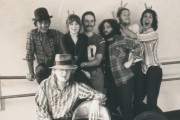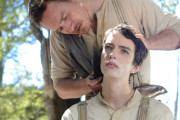Some of my favorite documentaries are in the vein of King of Kong: A Fistful of Quarters — intensely passionate people who battle over something that seems so trivial to others outside of that subcultural bubble. Even by those standards, Bodyslam: Revenge of the Banana! is completely absurd. It might be the most absurd documentary I have have even seen. It’s so absurd that the documentary actually has little to do with pro wrestling and is actually about pettiness, politics, and most of all, passion.
Anyone over the age of four is aware that professional wrestling is staged. However, Seattle Semi-Pro Wrestling is an even faker version of a fake sport. There is no ring, the performers have limited knowledge of the maneuvers, the few fans in attendance are encouraged to throw beer cans and to chant obscenities, and the characters who “wrestle” range from the ridiculous to the obscene, and frequently they are both. Chief among them is Ronald McFondle (a perverted Ronald McDonald parody), portrayed by Josh Black, whose finishing move… well, let’s just say it has a lot to do with his last name. In short, SSP is to WWE what Troma Films is to Warner Bros.
Several years ago, lifelong wrestling fan Paul Richards came into the SSP world. Richards mostly grew up on his own because he had no siblings and his mother was a drug addict, and he still lives in the dilapidated house he grew up in which he slowly repairs with the money he makes from finding change on the sidewalk and selling junk he finds. Though passionate about wrestling, Richards didn’t share the ludicrous humor of guys like Eddie Van Glam and Ronald McFondle, nor did he appreciate the group’s drinking and casual drug use. As a reject among rejects, Richards didn’t fit in and in an attempt to lighten him up (in the opinion of the SSP crew) or to embarrass him until he quit (in Richards’ opinion), the SSP writers gave him the character of the Banana. While the SSP crew wanted Richards to be a dancing yellow goof, he instead acted like an aggressive, ass-kicking villain.
What followed is a power struggle over the direction of the Banana character, and it eventually let to an all-out war between Richards and SSP involving online feuding, the police, and an unexpected journey through the democratic process and layers of government bureaucracy.
Pro wrestling results are predetermined, so that means someone is deciding who wins and loses and is in charge of the characters. For people who care about their characters and presentation, that means feelings get hurt. It’s easy to feel sympathy for Richards because he is essentially treated like an easy target, but on the other hand when he comes out swinging against SSP he’s fighting over the integrity of a banana costume. Nonetheless, a viewer has to understand this means more than just a Banana character. This is a battle over self-respect and a band of social outcasts who act out creatively in the only outlet they find enjoyment in.
Directors John Paul Horstmann and Ryan Harvie (this is the first feature as a director for both) catch the principles in emotional moments which proves that SSP meant a lot in their lives. Some of the performers share the stories of how they got to SSP, and they’re mostly heartbreaking. These really are individuals who felt like lost causes until they found SSP. Some, like McFondle, find being themselves uncomfortable and only come alive with their SSP friends.
The documentary doesn’t provide an update on what has happened to the principles or what became of Seattle Semi-Pro Wrestling in recent years. Internet searches have been inconclusive, so I hope when the film has a wider release it features a “Where Are They Now?” coda. As it is now though, Bodyslam: Revenge of the Banana! is one of the most ridiculous documentaries I have ever seen — and I mean that in the best possible way. If I said otherwise, I’d be worried what McFondle would do to me if he got his hands on me.















